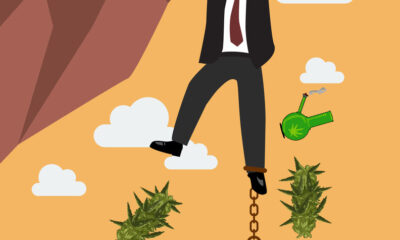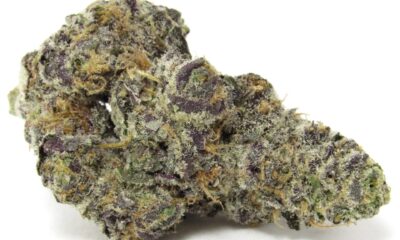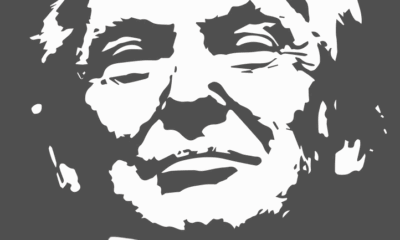B.C. decriminalization
Did Portugal Really Decriminalize Drugs? – Cannabis | Weed | Marijuana
Published
2 years agoon
By
admin
Did Portugal really decriminalize drugs? This seems like an obvious answer. In 2001, the European country decriminalized drugs. While possession and use were (and still are) technically illegal, the authorities treat it as a public health issue rather than a criminal offence.
The success of this program has prompted other jurisdictions, such as British Columbia, to try their hand at decriminalization.
However, there are substantial differences between the two. Whereas Portugal has over sixty therapeutic communities designed to eliminate addictive behaviour, British Columbia has zero of these communities.
Instead, the B.C. government is providing a “safe supply” brought to you by large pharmaceutical companies. The same ones that help foster the opioid crisis that requires this “safe supply.”
In B.C., if police catch you with decriminalized drugs, they hand over literature. In Portugal, authorities referred you to a “dissuasion commission.”
So did Portugal really decriminalize drugs? On the surface, yes. But as we experienced with COVID, making something a “public health” issue doesn’t mean you won’t be forced against your will.
Did Portugal Really Decriminalize Drugs?
Since 2001, Portuguese citizens caught with a small amount of illegal drugs for personal use aren’t arrested or given criminal records. Instead, police refer them to a “dissuasion commission” that consists of psychologists, social workers, and legal advisors.
The commission evaluates the individual’s drug use and decides whether they need treatment, education, or advice on reducing their drug use.
As Dr. Julian Somers told CLN, “They’re not saying overcoming addiction means not using drugs anymore. They say overcoming addiction means being socially reintegrated.”
The Portuguese recognized that it wasn’t drug use per se causing social problems. It was the individual’s relationship to drugs.
Cannabis connoisseurs are well aware of how little the pharmacology of the drug matters. When we consume cannabis, some experience joy, euphoria, or creativity. At the same time, others experience paranoia or anxiety. Some are social consumers, while others prefer to use cannabis alone before bed.
Since the Portuguese government accepted this fact about drugs, they were able to craft a decriminalization policy that worked.
But did Portugal really decriminalize drugs? Because decriminalization doesn’t mean anything if a “dissuasion commission” can compel you to behave or act in a certain way.
While the commission can impose fines, they cannot impose jail time or force people into treatment or rehab against their will. But they do confiscate your drugs. And in addition to fines, you may also be penalized with community service.
As opposed to B.C., where they let you keep your drugs and hand you literature, essentially telling you to “Just Say No.”
Has Portugal Succeeded?
In 2001, Portugal’s overdose rates were similar to Europe’s. In the first five years of decriminalization, drug deaths dropped dramatically.
Since then, they’ve been steadily rising. While drug deaths in Portugal remain some of the lowest in the E.U., the overdose trend is similar to the rest of Europe.
Portugal also has some of the lowest drug use in Europe. However, many dispute the data behind Portuguese consumption rates.
Critics of Portugal’s decriminalization also argue that it has failed to address the root causes of drug addiction. Others have argued that it doesn’t go far enough.
Of course, it’s almost impossible to compare one country with another. According to the data, in 2015, there were 33,290 “high-risk” opioid users in Portugal. This is higher than the European average but lower than when Portugal decriminalized in 2001.
So whether Portugal’s decriminalization is successful will depend on your criteria.
But if a public health “dissuasion commission” can impose fines, strongly suggest treatment, or force you to do community service – can it really be said that Portugal decriminalized drugs?
Did Portugal Really Decriminalize Drugs?
Did Portugal really decriminalize drugs? Technically, yes. But not in the sense of decriminalization being synonymous with legalization. And certainly not in the sense that decriminalization will lead to legalization.
Decriminalization in Portugal was a public health policy. And as we learned from COVID, categorizing criminal behaviours as “public health” disorders isn’t always a step in the right direction.
We have centuries of criminal law and customs to draw from. A public health commission is politically biased. It lacks due process, transparency, and lacks procedural safeguards, such as the right to a fair trial or the right to an impartial tribunal.
Addictive behaviour is a mental health issue. Did Portugal really decriminalize drugs? Yes, but drugs weren’t the issue. The issue was demand, not supply. This is what B.C. has failed to understand.
Suppose the only other alternative to criminalization is the authority of public health busybodies. In that case, it’s not evident that decriminalization is the preferred choice.
A better option is to legalize all drugs.
You may like
-


280E Tax Code Restrictions on Cannabis Companies Forever?- GOP Senators File Bill to Keep 280E No Matter What Happnes to Weed
-


New Blueberry weed strains are about to make a wave
-


Not A Hopeless Case, If You Medicate with Cannabis
-


Could 2025 be the year of university and cannabis industry partnerships?
-


What Trump’s Cannabis Policy Means for America and the International Markets
-


Texas Hates Weed…Not! – 62% of Registered Voters Support Cannabis Legalization in the Lone Star State
addiction
What Does Dr. Julian Somers Actually Believe? – Cannabis | Weed | Marijuana
Published
2 years agoon
March 6, 2023By
admin
What does Dr. Julian Somers actually believe?
Dr. Julian Somers is a researcher and professor in the mental health and addiction field in British Columbia, Canada. He is currently a professor at Simon Fraser University and serves as the Research Director of the Mental Health and Addictions Research Program.
In addition to his research, Julian has received numerous awards and recognitions for his contributions to the field of mental health, including the Canadian Institutes of Health Research (CIHR) Applied Public Health Chair in Urban Health, the Michael Smith Foundation for Health Research Scholar Award, and the Canadian Association for Health Services and Policy Research’s Best Paper Award.
But recently, because of his critiques of government policy and established “safe supply” narratives, he’s some “right-winger” retweeted by – trigger warning – Jordan Peterson and Pierre Poilievre.
Of course, as is usually the case, the reality is more nuanced. I caught up with Julian the other day via a Zoom call. I wanted to know: what does Dr. Julian Somers actually believe?
Do his critics have a point?
What Does Dr. Julian Somers Actually Believe?
So what does Julian Somers actually believe? In a nutshell, he believes the same thing Portugal said when they decriminalized drugs: “There is no such thing as addiction treatment.”
But what does that mean?
“They’re not saying overcoming addiction means not using drugs anymore,” says Julian. “They say overcoming addiction means being socially reintegrated.”
And indeed, that is the core of what Dr. Julian Somers actually believes. And that’s based on decades of extensive research.
How to Solve Addictive Behaviours
Social integration is when an individual feels connected to or is involved with their community. This can be as simple as meaningful conversations with friends, participating in social events, and contributing to local activities.
The idea is that if you build relationships with others, you can create a sense of belonging. Human beings are, after all, social animals. It’s not surprising that research suggests social integration enhances one’s sense of purpose and overall quality of life.
And for many researchers, from experts like Dr. Julian Somers to amateurs like myself, the evidence suggests “addictive behaviour” stems from this lack of purpose and belonging.
“Social integration is very close to what it would mean to have good mental health,” says Julian. “It means you have a job, a place to live, you’re part of a community. You feel good about other people and other people feel good about you.”
What does Dr. Julian Somers actually believe? That addictive behaviour is a mental health issue. That fixing Vancouver‘s Downtown Eastside means addressing the demand for drugs, not the supply.
“If there’s one thing we should have learned from the drug war,” says Julian, “Is that focusing on supply is a wasted effort.” Instead, “all our emphasis should have been on demand. On what’s up with the mental health of people in our population.”
Reasonable positions. And yet, “when I raise that, in one way or another, I am crucified.”
What Does Dr. Julian Somers Actually Believe? The Research
Why is Julian Somers criticized for his research? Take safe supply and Indigenous communities. He said:
“It seems obvious to me from all the available evidence right now that it would not help those communities to provide them with greater access to addictive drugs. It would help them most to support their growth of things they’re asking for: autonomy, resources, the ability to make decisions.”
Rat Park
This isn’t a controversial statement. Since the 1970s and 80s, researchers have known about “Rat Park.” Conducted by Canadian psychologist Bruce K. Alexander and his colleagues at Simon Fraser University, the studies challenged the prevailing narratives, which held that drug addiction was primarily a result of the pharmacology of the drug themselves.
The researchers set up two environments, a standard laboratory cage with access to only water and cocaine; and the other “Rat Park” full of toys, food, and other rats to socialize with, as well as cocaine. The researchers found the rats in Rat Park were less likely to become addicted to cocaine.
Brain Disease Model is Junk
Of course, rats aren’t people. But the general idea that social and environmental factors play a significant role in addiction is supported by numerous other studies. Somers references the number of American soldiers that used heroin in Vietnam. When they returned after the war, fewer than 5% continued using.
And there’s neuroscientist Mark Lewis’ research on brain imaging and the brain disease model of addiction. Mark’s research highlights the importance of environmental factors in addictive behaviour. He argued that addiction is not solely the result of brain changes but influenced by social and cultural factors. He also suggested social isolation and stress increase the risk of addiction.
Who Are Julian Somers’ Critics?
This Press Progress article demonstrates the mentality of the people attacking Julian Somers’ position. It posits that Somers and others are in it for the money.
At no point does it grapple with Julian’s ideas but parrots the open letter that his work criticizing safe supply was “critically low quality.”
“It’s a reinvention of ad hominem attacks,” says Julian, recalling a professor of his many years ago. He taught that when your critics shift the discourse from the ideas to the person making the ideas, you can smile. Because you know they’ve got nothing.
And this is likely the case here. The criticisms that Somers and others like him are only in it for the money are either deeply ironic or blatantly hypocritical.
In his research, Julian and his team have found that “almost all the papers in which authors had been advocating for so-called safe supply, were based in B.C.. They were people who did not have backgrounds in addiction, they came from an HIV centre. And they seem to have simply rolled out a business model that had worked in HIV. Which is obviously, very pharmaceutical.”
Pharmaceutical public-private partnerships are the name of the game.
“They seem to be using the same business model, partnerships with industry, to launch a presence in the addiction field… Their work was conspicuously pharma intensive.”
“And yet, in their documents, in their peer-reviewed publications, not one of them mentions the fact that people need housing, people need help getting jobs. People need help addressing their mental illnesses. Instead they say, we need immediately safe supply. In fact, it goes further. We need safe supply across North America.”
And why is this? Julian Somers believes this might be a follow the money story.
What Does Dr. Julian Somers Actually Believe? Follow the Money
Julian imagines a scenario that isn’t out of the realm of possibility. A conversation like this has undoubtedly happened more than once.
Somewhere in a New York office, suits are reeling from the oxy scandal. One of them is thinking of getting into diet pills or maybe vitamins. But another suit persuades him otherwise. “There’s this group out in B.C.,” he says, and they’ve figured out how to sell not only opioid compounds but stimulants and benzos.
“They’re calling it safe supply.”
The B.C. government is promising is get Wall Street’s product out front of the Nicaraguans and Colombians. It’s a new era of the drug war.
“It’s outrageous how it’s happened in a ten year period,” says Julian. “Along the way, there are people who are supporting their agenda and I think it’s conspicuously physicians.”
Physicians know very little about addiction. It’s a small part of med school; when it’s taught, it’s the brain-disease model. So doctors approach addictive behaviours as if it were a diabetes diagnosis.
What Does Dr. Julian Somers Actually Believe?
Julian Somers believes that if the country could have a mature conversation about drugs and addictive behaviour and take the necessary steps to create a population with better mental health, we would be “very close to having heroin available for purchase.”
The fact is, says Julian: “Most people who have addictions at one point, don’t have them later and they don’t all die.”
Brain imaging does not support the brain disease model of addiction. “What [Mark Lewis’ research] has pointed out,” says Julian, “is that the changes that occur before, during, and after addiction, are consistent with our understanding of how the brain reflects learning.”
“It’s actually tremendously inspiring, optimistic knowledge,” says Julian. “We are capable of changing!” And that’s what Julian Somers actually believes.
That the brain disease model of addiction is “vacuous and offensive” since it creates a segregation between rich and poor treatment.
While the rich are sent to places like the Betty Ford Center to work on their mental health, the poor are kept isolated and fed pharmaceuticals.
“It’s like two different worlds. And if you’re a physician, on some level, you know this,” says Julian.
So the question remains: what are his critics’ excuses? Especially the left-wing populists who claim to work and fight for the poor, oppressed, and helpless.
Don’t they know “safe supply” lines the pockets of corporate pharma without addressing the mental health issues of those suffering from addictive behaviours?
adastra labs
Health Canada Approves Cocaine Production? – Cannabis | Weed | Marijuana
Published
2 years agoon
March 3, 2023By
admin
Has Health Canada approved a B.C.-based cannabis company to produce cocaine? Adastra Labs released a statement saying Health Canada granted them a “Dealer’s Licence” that allows them to possess, produce, sell and distribute 250 grams of cocaine.
The company can legally import coca leaves to manufacture and synthesize the substance locally.
Additionally, the Dealer’s License grants Adastra the right to possess, produce, sell and distribute up to 1,000 grams of psilocybin mushrooms.
“Harm reduction is a critically important and mainstream topic, and we are staying at the forefront of drug regulations across the board,” said Michael Forbes, CEO of Adastra.
“We proactively pursued the amendment to our Dealer’s License to include cocaine back in December 2022. We will evaluate how the commercialization of this substance fits in with our business model at Adastra in an effort to position ourselves to support the demand for a safe supply of cocaine.”
Health Canada Approves B.C. Cocaine Production? News to the B.C. Premier
British Columbia‘s unelected Premier David Eby told the press that he was “astonished” that Health Canada granted a cannabis company the right to possess, produce, sell and distribute cocaine.
He said: “If Health Canada did in fact do this, they did it, not only without engaging with the province, but without notice to us.”
“It is not part of our provincial plan,” he added, referring to the joint effort from Ottawa and B.C. to decriminalize drugs like cocaine, opioids, amphetamines and ecstasy.
On January 30, 2023, possessing 2.5 grams or less of these substances is no longer a criminal offence. The police instead hand out literature suggesting the person seek professional help.
B.C.’s opposition parties aren’t happy about Health Canada approving cocaine production in the province. During Question Period, B.C. Liberal Leader Kevin Falcon asked the premier, “What on earth is going on here?”
“Since the NDP decriminalized hard drugs like cocaine, fentanyl and methamphetamine, this company’s stock price has doubled.” He said. “But let’s be really clear here. Cocaine isn’t prescribed. It isn’t safe. This is wrong. Commercializing cocaine as a business opportunity amounts to legalizing cocaine trafficking, full stop. So, why has this premier allowed for the commercialization of cocaine?”
Health Canada has yet to make a statement to the press as of this publication.
Health Canada Approves Cocaine Production? Follow the Money
Interesting that politicians would disapprove of Health Canada approving cocaine production. Canada’s cannabis connoisseurs are well aware of how former cops and politicians have capitalized on the legal cannabis market.
Meanwhile, the legacy growers in B.C. are either taxed to oblivion or kept underground and “illegal.”
The same is valid here. While the CEO of Adastra has a past with methadone pharmacies and needle exchange programs, the real corruption comes from within the government.
Dr. Perry Kendall, for example, is B.C.’s former provincial health officer. He held the job for twenty years.
He now owns a heroin company.
So the guy who still influences Victoria’s politicians and bureaucrats, who promotes “safe supply” and decriminalization, is also profiting from it.
Health Canada approving cocaine production is about making sure decriminalization lines the pockets of key players.
How Dangerous is Cocaine, Anyway?
Of course, the moral panic over Health Canada approving cocaine production is a nothingburger. The real crime is that a) cocaine is illegal, and b) Health Canada picks and chooses which private companies can produce cocaine while it remains illegal for the rest of us.
But what about what the B.C. Liberal leader said? That cocaine isn’t safe. That producing made-in-B.C. cocaine is wrong?
Drug war propaganda, unfortunately, still holds sway over too many Canadians, whether on the left or right of the political spectrum. Consider some of these myths and facts about cocaine.
Myth: Cocaine is highly addictive, even in small amounts.
Fact: Forming a cocaine habit is one of the easiest things in the world. However, you will not get “addicted” after snorting one line—people that do have psychological problems. The pharmacology of the drug does not override your free will and force you to consume it.
Myth: Cocaine is safer than crack cocaine.
Fact: They’re the same drug. Crack cocaine is cocaine combined with a base, typically baking soda. If you were talking about lung health, snorting coke would be safer than smoking crack.
Myth: Cocaine will lead to financial ruin
Fact: Poor psychological problems will lead to financial ruin. Many people have balanced their cocaine use or habits without impacting their social, business, and family lives.
Myth: Cocaine makes you crazy
Fact: Cocaine enhances mood and increases alertness and energy levels.
Of course, cocaine has side effects. It can cause heart palpitations and high blood pressure, increasing your risk of heart attacks, strokes, and seizures.
Not to mention, sketchy manufacturers of street cocaine may mix it with another drug, like fentanyl.
Health Canada Approves Cocaine Production – Now What?
The anti-drug puritans from both sides of the aisle are wrong. Some make a case for why Adastra Labs needs to provide a “safe supply,” while others are adamant that this constitutes “legalizing cocaine trafficking” and the commercialization of the drug.
But the problem isn’t drugs. It’s people’s relationship with them. For example, because I have asthma, I rarely, if ever, smoke cannabis anymore. I make my own edibles and extracts.
If I were to start smoking again, I’d be putting myself at a significant health risk. I would be turning a healthy relationship with cannabis into a problematic one.
All drugs should be legal. But so should drug education free of drug war propaganda.
Consider cocaine versus extreme sports like backcountry skiing.
Individuals who pursue extreme sports know the risks and take precautions to minimize them. Depending on the sport, an individual may even receive extensive training beforehand.
Individuals who choose to use cocaine must also be aware of the drug’s risks and take precautions to minimize them.
How can cocaine users minimize their risk? One, ensure their mental health is in order. Are you using cocaine at a party to have some fun? Or are you by yourself using it as a coping mechanism to deal with stress?
Two, make sure your physical health is in order. If you have a poor or aging heart, cocaine isn’t the drug for you.
And third, the best way to minimize cocaine risks is to ensure your supply isn’t tainted with other drugs or substances you don’t want.
That’s why Health Canada’s approval of local B.C. cocaine production is a step in the right direction. Now, only if they’d open the market to everyone instead of a single cannabis company.

280E Tax Code Restrictions on Cannabis Companies Forever?- GOP Senators File Bill to Keep 280E No Matter What Happnes to Weed

New Blueberry weed strains are about to make a wave

Not A Hopeless Case, If You Medicate with Cannabis

Could 2025 be the year of university and cannabis industry partnerships?

What Trump’s Cannabis Policy Means for America and the International Markets

Texas Hates Weed…Not! – 62% of Registered Voters Support Cannabis Legalization in the Lone Star State

Linked In Post – Jon Dennis, Psychedelic Lawyer: Washington SB 5201, the regulated psilocybin access bill, was considered today by the Senate Committee on Labor & Commerce ( 18 Feb 2025)

The rapid collapse of MedMen co-founders’ latest marijuana venture

David Downs’ sickest weed genetics picks of 2025

The Future King of Cannabis will be THC-Infused Beverages

Distressed Cannabis Business Takeaways – Canna Law Blog™

United States: Alex Malyshev And Melinda Fellner Discuss The Intersection Of Tax And Cannabis In New Video Series – Part VI: Licensing (Video)

What you Need to Know

Drug Testing for Marijuana – The Joint Blog

NCIA Write About Their Equity Scholarship Program

It has been a wild news week – here’s how CBD and weed can help you relax

Cannabis, alcohol firm SNDL loses CA$372.4 million in 2022

A new April 20 cannabis contest includes a $40,000 purse

Your Go-To Source for Cannabis Logos and Designs

UArizona launches online cannabis compliance online course
Trending
-

 Cannabis News2 years ago
Cannabis News2 years agoDistressed Cannabis Business Takeaways – Canna Law Blog™
-

 One-Hit Wonders2 years ago
One-Hit Wonders2 years agoUnited States: Alex Malyshev And Melinda Fellner Discuss The Intersection Of Tax And Cannabis In New Video Series – Part VI: Licensing (Video)
-

 Cannabis 1012 years ago
Cannabis 1012 years agoWhat you Need to Know
-

 drug testing1 year ago
drug testing1 year agoDrug Testing for Marijuana – The Joint Blog
-

 Education2 years ago
Education2 years agoNCIA Write About Their Equity Scholarship Program
-

 Cannabis2 years ago
Cannabis2 years agoIt has been a wild news week – here’s how CBD and weed can help you relax
-

 Marijuana Business Daily2 years ago
Marijuana Business Daily2 years agoCannabis, alcohol firm SNDL loses CA$372.4 million in 2022
-

 California2 years ago
California2 years agoA new April 20 cannabis contest includes a $40,000 purse














